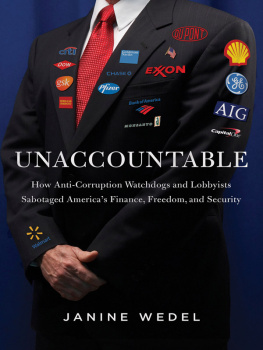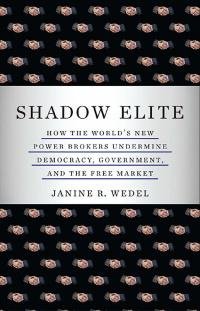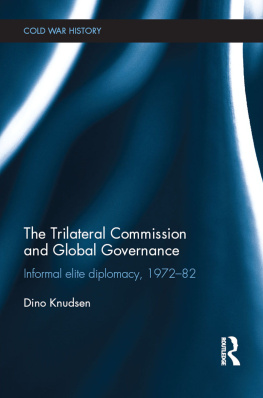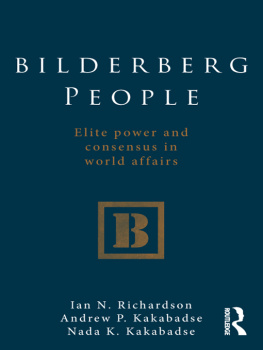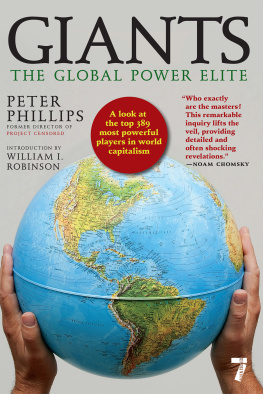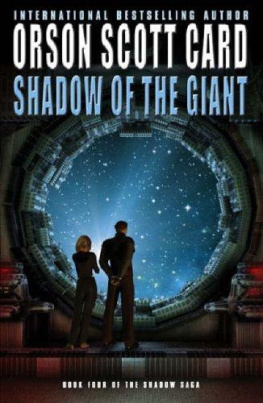JANINE R. WEDEL

A Member of the Basic Books Group
New York
Copyright 2009 by Janine R. Wedel
Published by Basic Books,
A Member of the Perseus Books Group
All rights reserved. No part of this book may be reproduced in any manner whatsoever without written permission except in the case of brief quotations embodied in critical articles and reviews. For information, address Basic Books, 387 Park Avenue South, New York, NY 100168810.
Books published by Basic Books are available at special discounts for bulk purchases in the United States by corporations, institutions, and other organizations. For more information, please contact the Special Markets Department at the Perseus Books Group, 2300 Chestnut Street, Suite 200, Philadelphia, PA 19103, or call (800) 810-4145, ext. 5000, or e-mail .
Designed by Jeff Williams
Library of Congress Cataloging-in-Publication Data
Wedel, Janine R., 1957
Shadow elite : how the world's new power brokers undermine democracy, government, and the free market / Janine R. Wedel.
p. cm.
Includes bibliographical references and index.
ISBN 978-0-465-09106-5 (alk. paper)
1. Corruption. 2. Political corruption. 3. Power (Social sciences) 4. Elite (Social sciences) 5. Privatization. 6. Government accountability. I. Title.
JF1525.C66W43 2009
320.9dc22
2009038735
10 9 8 7 6 5 4 3 2 1
To my parents,
Arnold and Dolores Wedel

CONTENTS

In my work as a social anthropologist, people often tell me unusual stories. For instance, in Poland recently, a scholar and former speaker of the parliament described to me an interaction in police headquarters a few years ago. As one of several esteemed members of a task force advising the national police on how to transform itself into an institution compatible with democracy, he met with the chief of police and the other advisers. During a break in the meeting, he thought he smelled more than the usual cigarette smoke. When he ribbed his fellow advisers, they acknowledged that they, indeed, had been smoking marijuana during the break.
While my friend told this lighthearted story to amuse me, sensing I would appreciate its absurdity, it is actually telling. It is the kind of tale that one hears in a society with a long experience of upending official rulesa society that persisted, despite occupying armies, imposed regimes, and the attendant scarcities, repressions, and hardships. High-ranking Polish government advisers ignoring prohibitions against smoking marijuana may be inconsequential, but in fact this tale illustrates a willingness, even delight, in flouting rules. Rules were made to be broken, goes the old saying, but rules are also what we live by. Yet rules, I have discovered, are being flouted on a wide scale. Nowadays, even in the democratic-model-for-the-world United States, people are systematically upending rules and authority, not in search of either personal enjoyment or basic necessities, but to wield high-level power and influence.
I have come to this bold conclusion after spending the better part of three decades observing people as they employ teamwork, flexibility, and ingenuity to work around the rules, and studying the conditions that encourage them to do so. I did this first in Eastern Europe under communism and as countries in the region moved away from it. Then I charted the activities of archetypal players who flouted rules and authority to wield influence, this time on a global stage, and investigated the conditions that encourage them to do so in the wider world and especially in the United States.
I have written this book to explain the new breed of transnational players who, far from something as trivial as smoking marijuana, toy with official rules and not only get away with it, but often make decisions about policies that affect us allin areas ranging from the economy and foreign affairs to government and societywhile fashioning new rules of the game to benefit themselves.
In a twisted sort of way, examining eastern Europe up closethrough its transformations away from communism over the last quarter centuryhas been excellent preparation for making sense of what is happening in the United States today. In communist Poland, the necessity of getting around the system bred absurdities, ranging from the employee who lifts a desk from a state-owned factory to sell for cash and then complains when a fellow worker steals it from him, to the employee at Communist Party headquarters who doubles as an underground publisher, printing his leaflets at headquarters. While the totalitarian nature of the state necessitated such strategies, America today seems increasingly to offer up absurdities of its own.
I have written this book to offer readers a lens through which to view what I identify in this book as a new system of power and influence, and to explain the players and networks that drive it in a rapidly transforming American and global environment. As an anthropologist, Im trained to go behind the scenes, beyond what people say they are doing, and beyond government and bureaucratic organizational charts. But all of us must do so now because that is the only way to see that how the world is organized has changed, amid such developments as the breakdown of bureaucratic and professional authority and new information technologies. The new players and networks of power and influence do not restrict themselves to activities in any one arena. Rather, through their activities, they connect state with private, bureaucracy with market, political with economic, macro with micro, and global with national, all the while making public decisionsdecisions backed by the power of the state. As influencers perform overlapping roles and networks of policy deciders snake through official and private organizations, creating a loop that is closed to democratic processes, we have to focus on themtheir roles, activities, and sponsorsand how they maneuver these levels if we want to get to the bottom of power and influence.
That is why, as I realized over the course of this project, the frameworks and terms that weve long used to understand power and influence are no longer sufficient to explain what is happening. While it became clear early on that terms like lobbyist or interest group dont suffice, naming this new breed of players and networks proved to be a challenge. Here I am grateful to two scholars in particular. Flexian grew out of a conversation with Lloyd Jeff Dumas, flex net from a conversation with Susan Wright. I am indebted to both. As well, terms like conflict of interest and corruption also proved inadequate to explore how agenda-wielding players actively structure, indeed create, their roles and involvements to serve their own agendasat the expense of the government agencies, shareholders, or publics on whose behalf they supposedly work. These players not only flout authority, they institutionalize their subversion of it. Thus, I have also written this book so that people can see the trade-offs they inadvertently make as they tolerate, even approve of, this state of affairs and suffer from loss of democratic input, control, and accountability.


